Best managed WordPress hosting of 2025
Save time setting up your website

Sign up for breaking news, reviews, opinion, top tech deals, and more.
You are now subscribed
Your newsletter sign-up was successful
We list the best managed WordPress hosting, to make it simple and easy to configure your own website without needing to micromanage simple hosting tasks.
Managed WordPress hosting gives you the peace of mind that there is always someone there taking care of the hosting infrastructure for your site. Day and night, weekday and weekend if there is a problem (when not if, really) someone will be on hand to install critical updates and make sure everything is working smoothly.
Managed WordPress hosting can also give you better speeds and performance if you're not an expert on how to configure a WordPress site and server. Most of the best WordPress hosing providers offer managed WordPress hosting but not all. These are our top pics specifically for those who need managed hosting.
The best managed WordPress hosting of 2025 in full
Why you can trust TechRadar
Best managed WordPress hosting overall
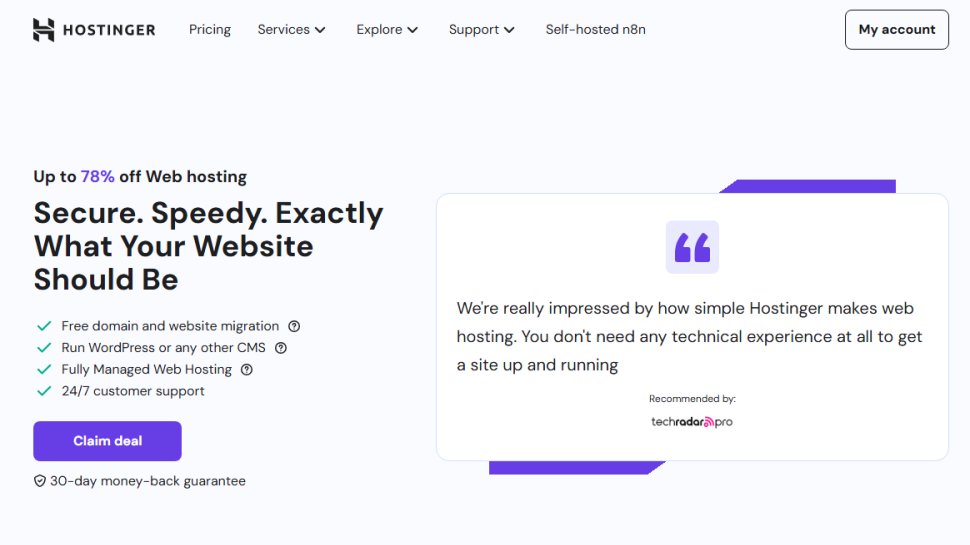
Reasons to buy
Reasons to avoid
Hostinger's managed WordPress hosting may not match WP Engine for power, but it still all the core essentials you'd expect (and a whole lot more) for a fraction of the price.
Free auto website migration imports your site from a previous host, for instance (there's 1-click WordPress installation if you're starting from scratch.) A custom LiteSpeed setup and WordPress object cache improves performance, staging support allows you to test site updates before they go live, and there's WooCommerce performance optimization, a WordPress vulnerability scanner, on-demand backups and more.
Prices start at a tiny $2.99 a month over four years for the Premium plan. The $3.99 a month Business plan adds more resources and daily backups, and the high-end Cloud Startup plan adds a dedicated IP and priority support for $9.99 a month. There's no trial, but all plans are protected by a 30-day money-back guarantee, so you're able to request a refund if the service isn't right for you.
Read our full Hostinger review.
Get the best deal on Hostinger products with our Hostinger promo codes.
Best flexible managed WordPress hosting

Reasons to buy
Reasons to avoid
InMotion Hosting is an employee-owned and operated domain name and web hosting company founded in 2001.
InMotion Hosting offers plans for a variety of users, from dedicated and shared to VPS and WordPress hosting along with several e-commerce tools.
WordPress hosting plans start off at $3.49 per month (for the initial payment on the 3-year plan) and that includes one website and 100GB SSD storage, being suitable for 20,000 visitors a month. InMotion has four price plans available and all of them offer unlimited data transfers.
Besides having numerous price plans for each of its hosting options, InMotion Hosting has numerous free add-ons, free e-commerce tools, and unlimited emails.
While there is no free trial, and prices are far from cheap compared to some rivals, InMotion Hosting does include an impressively lengthy 90-day money-back guarantee.
Read our InMotion Hosting review.
Best managed WordPress hosting for management
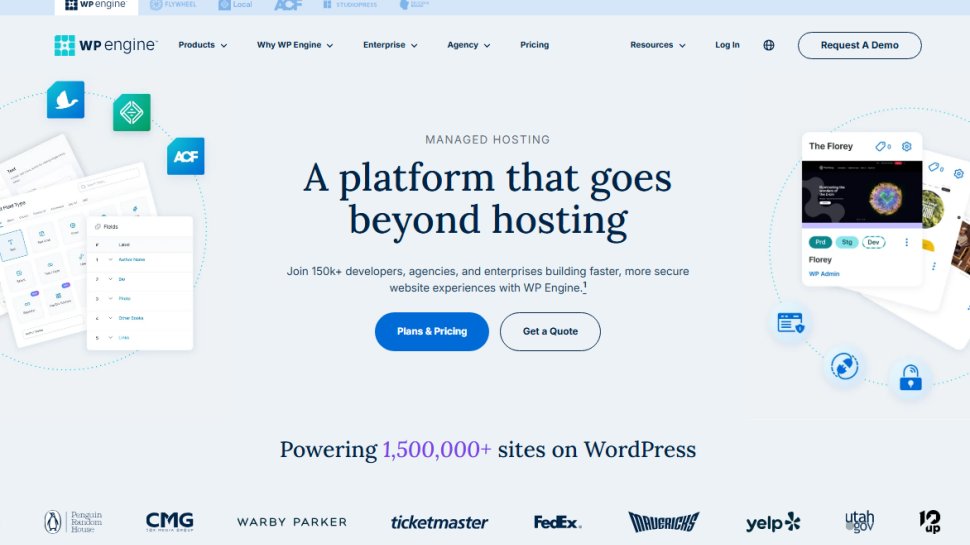
Reasons to buy
Reasons to avoid
WP Engine is the leading WordPress digital platform. It hosts excellent uptime, WordPress-specific security and unlimited monthly transfers.
WP Engine doesn't forget the core hosting essentials, either, and even the most basic plans include free SSL, automatic and on-demand backups, and 24/7 support.
You can use WP Engine’s ‘actionable intelligence’ to gain insight into the performance of your pages, content and applications.
WP Engine has four different price plans. All include free migration and free page performance. If you pay for a year’s subscription upfront, you get three months free.
Prices start off at $24 per month ($20 per month if you choose annual billing) which includes a 60-day risk free guarantee. Higher plans get you more resources and support extra sites. WP Engine is more expensive than most of the shared hosting competition, but it's a quality service, and well worth the premium for demanding or high-traffic sites.
Read our WP Engine review.
Best affordable managed WordPress hosting
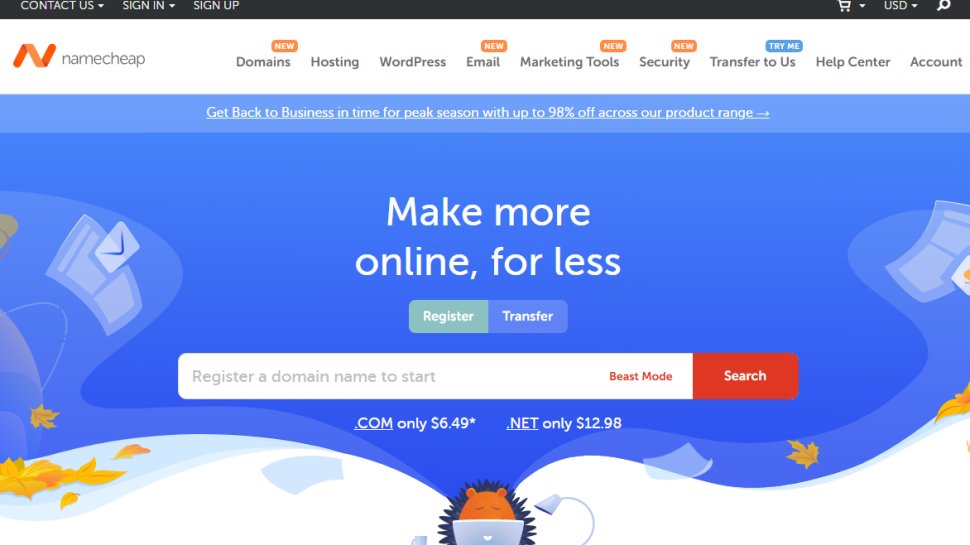
Reasons to buy
Reasons to avoid
Namecheap's EasyWP managed WordPress hosting isn't the most powerful or feature-packed around, but as the name suggests, it's simple to use, and delivers great speeds for a very price.
Standout performance features include Namecheap's custom cloud platform, its custom EasyWP WordPress cache plugin and a free CDN (Content Delivery Network) with even the cheapest plan. Namecheap claims that what you put all this together, its EasyWP platform is around three times faster than running WordPress on standard shared hosting.
Pricing starts at $2.91 a month billed annually for a basic 10GB storage setup capable of handling around 50,000 visitors per month. The Easy WP Pro plan offers the best value, though, with 50GB storage, more resources, free SSL and support for up to 200,000 visitors a month, yet still priced cheap at only $4.91 a month.
Although we're not completely confident about the '3x as fast' claim, Namecheap's EasyWP is a likeable setup for novices and the budget-conscious. But experts might be disappointed by the lack of features: no staging, no cPanel or automatic updates, amongst others. And almost uniquely, even the top-of-the-range EasyWP plan only supports a single site. If you might want to run other WordPress sites, you'll have to buy a new plan for each one, so bear that in mind.
Read our Namecheap review.
Check out our Namecheap promo codes to get the best deals on Namecheap products.
Best managed WordPress hosting for small websites
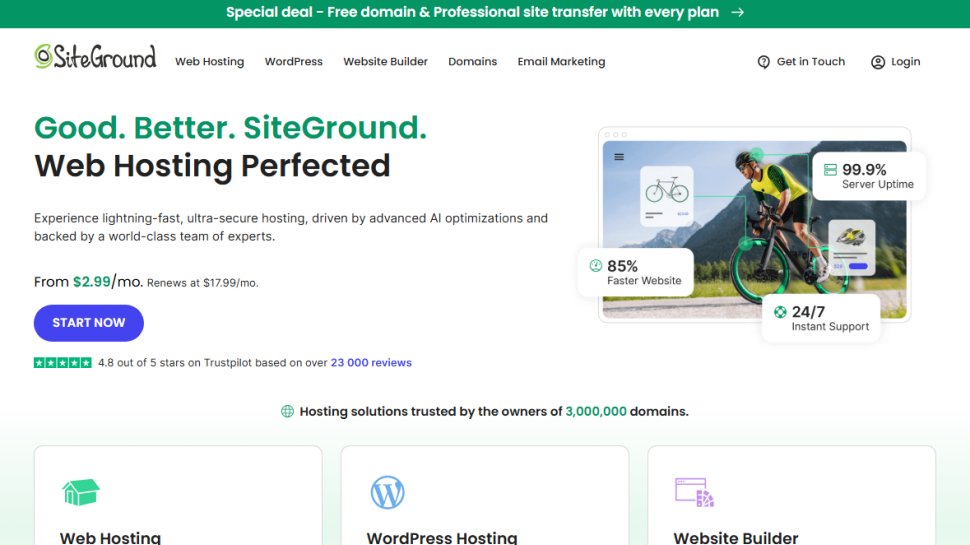
Reasons to buy
Reasons to avoid
SiteGround was founded in 2004 and provides shared hosting, cloud hosting and dedicated servers.
SiteGround lets you choose from one of six data centers on which to host your website. These are based in Sidney (Australia), Singapore (Asia), Iowa (USA), Frankfurt (Germany), Eemshaven (Netherlands) and London (UK).
SiteGround offers users CloudFlare CDN, free SSL certificates and daily backups of their website’s data. All of their shared hosting plans include managed WordPress.
The platform’s customer support includes live chat as well as a phone option. All support services are available 24/7.
The ‘StartUp’ plan begins at $14.99 per month (with a $3.99 initial payment) which includes one website, 10GB web space and is suitable for 10,000 visits monthly. The ‘GrowBig’ plan for $24.99 monthly ($6.69 for initial payment) allows for multiple websites, 20GB of web space and is suitable for 25,000 visits.
SiteGround’s ‘GoGeek’ plan starts at $39.99 per month ($10.69 for initial payment) which includes 40GB of web space and is suitable for 100,000 visits monthly. SiteGround does not offer a free trial but has a 30-day money-back guarantee.
Some users have reported issues with being automatically logged out when signing in on multiple devices.
Read our SiteGround review.
Best managed WordPress hosting for beginners

Reasons to buy
Reasons to avoid
Bluehost, a web hosting company founded in 2003, tries to make the daunting task of starting a new web site easy. It offers plenty of options to those new to web hosting while still offering tools for the more experienced user.
All new subscribers can set up a WordPress site with a single click of their mouse. Also, newbies can rely on Blue Spark, a specialized service that helps new users with everything WordPress related.
Bluehost are currently offering all their WordPress plans at a reduced rate. Prices start at $2.75 a month for a single WordPress site complete with 50GB of website space. The ‘Plus’ and ‘Premium’ packages are on offer for $5.45 per month. These both include unlimited WordPress sites and unlimited website space. The ‘Premium’ package includes domain privacy and SiteBackup Pro. Furthermore, WP Pro plans are available, which bring additional improvements and features with prices starting at $9.95. To save money all year round, be sure to check out our Bluehost promo codes.
More inexperienced users have reported that the dashboard can be difficult to navigate if you are unfamiliar with all the terminology.
Read our Bluehost review.
Best managed WordPress hosting for enterprise

7. WordPress VIP
Reasons to buy
Reasons to avoid
WordPress VIP is a fully managed cloud platform. Users of VIP have access to expert guidance, code review and around the clock support.
Customers get their own Git repository and ZenDesk account. Once your code is ready, you send it to the VIP team. Experts at VIP go through each line of code in your repository. This can take 4-6 weeks. If any issues are found, they’re raised on GitHub. Once these have been removed the code is transferred to your project and you are online. VIP adheres to strict coding standards.
One of the main attractions of VIP is the ‘always on’ support. VIP engineers watch for any issues that may arise and fix them proactively on behalf of the client. Once rectified, a report will be sent to you explaining what occurred.
Sadly, pricing details aren't available on the site, and would-be customers will need to contact WordPress VIP directly in order to get a quote.
Further note that some users have reported delays with setting up and building sites, although of course your mileage may well vary.
Best managed WordPress hosting for ecommerce
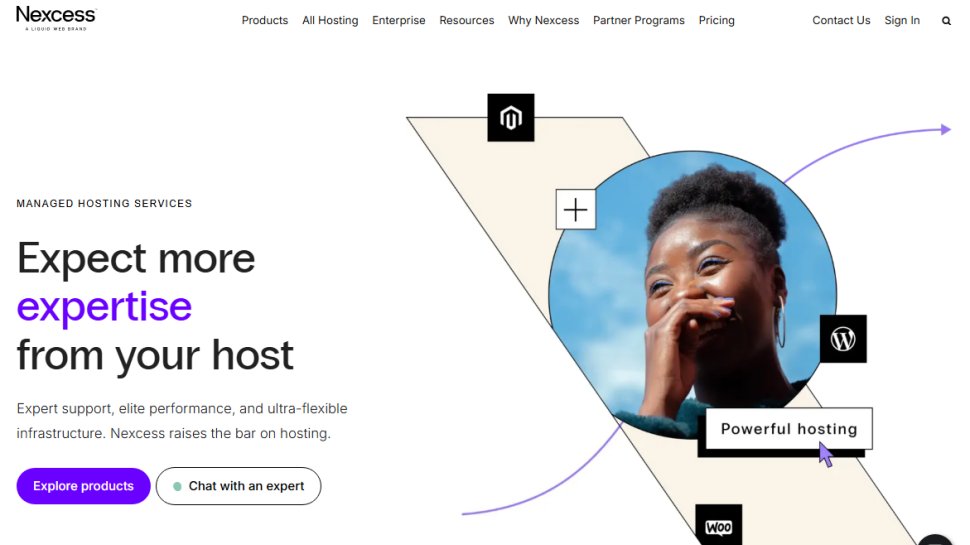
8. Nexcess
Reasons to buy
Reasons to avoid
Nexcess, a Liquid Web brand, specializing in managed WordPress, Magento, and WooCommerce hosting. It has a decent server infrastructure, and offers a range of plans on a solid and reliable platform, which has been configured for optimized WordPress performance.
Its cheapest managed WordPress hosting plan costs $13.30 per month for the first three months and increases to $19 per month after. In that plan, you get 15GB of storage, 2TB of bandwidth and can host a single WordPress website.
Additional paid plans that allow you to host multiple WordPress websites are also available, with increases to disk space and bandwidth along with the number of sites to host. The hosting provider has plans that let you host up to 250 websites, offering a generous 800GB of storage and 10TB of bandwidth.
Nexcess also promises no traffic limits, limited pageviews, or fees of extra resource use. The company provides automatic plugin updates, which are routinely tested to ensure they are running smoothly, malware monitoring, multi-layered caching, and one-click staging to keep your WordPress website performing at its peak.
Additionally, users have full server access, free SSL certificates, daily backups, as well as developer tools as required. And if you have an existing WordPress website you can migrate it to Nexcess for free.
Best budget managed WordPress hosting
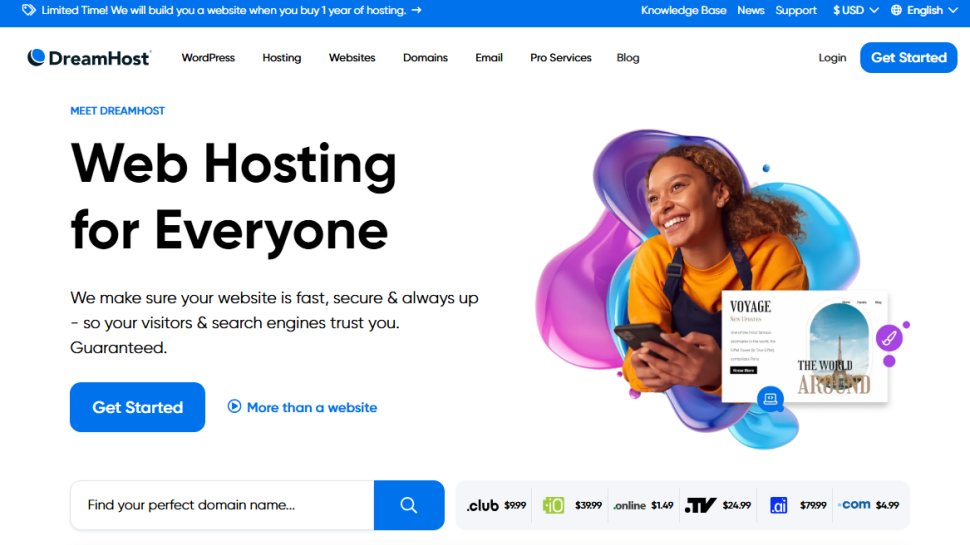
Reasons to buy
Reasons to avoid
DreamHost is owned by New Dream Network LLC which was founded in 1996. It’s both a web hosting provider and a domain name registrar.
DreamHost’s ‘Shared Starter’ plan starts at $2.59 per month. This includes a shared hosting server, a single WordPress website, unlimited traffic, 1-click SSL certificate, fast SSD storage, 24/7 support and an upgrade to add email.
The ‘DreamPress’ (managed WordPress plan) package starts at $16.95. This includes all of what the ‘Shared Starter’ plan has to offer along with 30GB SSD storage, JetPack free preinstalled, daily backups and a few other extras.
All of DreamHost’s hosting solutions are fully managed services, although note that some inexperienced users have reported issues with getting started. Also, email costs extra with the starter plan, so check carefully before you sign up.
Read our DreamHost review.
Best managed WordPress hosting for content
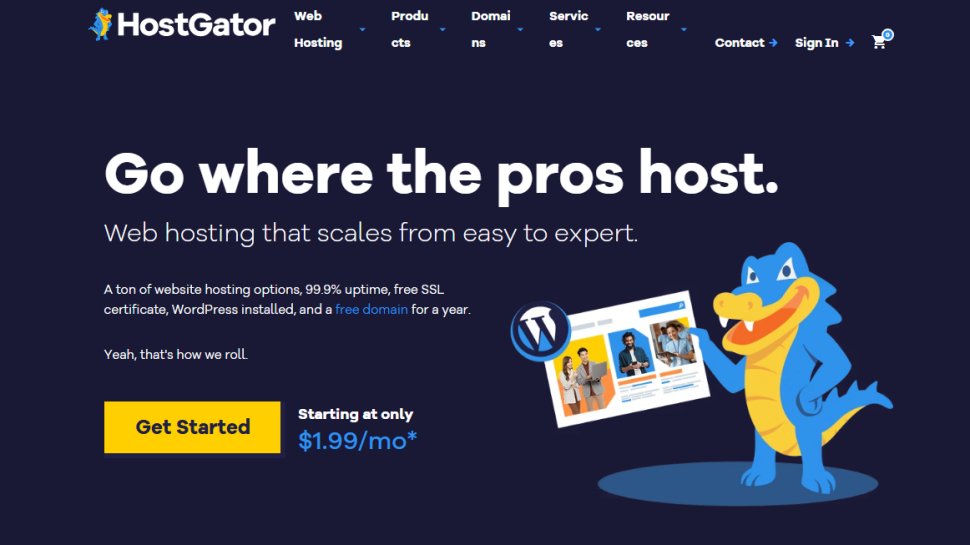
Reasons to buy
Reasons to avoid
HostGator was founded in 2002, and it provides shared, reseller, VPS and dedicated web hosting.
HostGator’s Website Builder comes with a handy drag and drop feature, and includes a wide range of themes. Some of the features are pre-built to help make the creation process easier and faster.
HostGator claims that load times for WordPress sites are up to 2.5 times faster when compared to its own shared hosting due to the superior server architecture of its managed WordPress hosting.
This host offers a WordPress Cloud Interface where you can manage backups, access all your email accounts and other hosting options. You can also allocate server bandwidth from here.
HostGator offers three WordPress cloud hosting plans. The ‘Starter’ plan is currently priced from $5.95 per month for 1 site, 100,000 visits per month, 1GB free backups and a free SSL certificate. The ‘Standard’ plan is on offer from $7.95 per month for 2 sites, 200,000 visits per month, 2GB backups and a free SSL certificate.
HostGator’s ‘Business’ plan is also on offer at $9.95 per month. This includes 3hree sites, 500,000 visits, 3GB backups and a free SSL certificate. However, do note that the prices quoted are based on multi-year subscriptions.
According to online commentators, the purchase price for additional domains can be quite steep.
Read our HostGator review.
You could save on HostGator VPS hosting with our HostGator promo codes.
Best managed WordPress hosting for small business

Reasons to buy
Reasons to avoid
IONOS is owned by a German company, United Internet. It was founded in 1988, and offers domain registration, cloud servers, VPS and dedicated servers.
IONOS boasts excellent customer support and easy to use web creation tools. More inexperienced users might find this provider more suitable to their needs.
IONOS’s packages start at $3 per month, renewing at $4 per month. This includes 1 WordPress project, 25GB SSD storage, unlimited visitors and managed WordPress. Upon registration, you are offered a domain name free for 12 months. This is only valid upon purchase of any of the firm's plans.
Users who sign up for the ‘Business’ plan receive 100GB SSD storage, 100 email accounts (2GB each), max CPU & MEM resources and unlimited visitors. This plan starts at $1 for the first year and then $8 per month thereafter.
The ‘Unlimited’ plan has a price of $8 per month for the first year, with renewal being $16 per month. It includes unlimited projects and unlimited SSD storage, unlimited databases and email accounts, as well as SiteLock malware protection and RailGun CDN.
Note that some online commentators have complained of issues around downtime.
Read our IONOS review.
Best managed WordPress hosting FAQs
What is managed WordPress hosting?
The word "managed" for WordPress means that the hosting provider handles all the basic hosting administrative tasks, such as installing WordPress, automating daily backups, WordPress core updates and server-level caching.
Managed hosting providers usually also help you in getting a leg up on their service. When you purchase a hosting package from a provider, they will walk you through the process of integrating your website on their servers.
Managed WordPress hosting providers usually only deal with that particular platform.
If you don't have the knowledge to set up your server space the way you need to in order to launch your WordPress website, or if you find you don't have the time to do so, a managed hosting solution may be an ideal option for you to consider.
How to choose the best managed WordPress hosting for you?
Whether you have one WordPress site or 20, you're going to want to pick a WordPress hosting service that makes your life as easy as possible.
Similar to the process of choosing the best web hosting service providers, you will need to create a small checklist of the features and capabilities you are looking for in a managed WordPress hosting service.
You will also need to take pricing into consideration as managed WordPress hosting costs a fair bit more than the average shared hosting package.
Choosing the wrong managed WordPress hosting could cost you more money than you bargained for.
How we tested the best managed WordPress hosting service
Our experts sign up for each managed WordPress hosting provider and test their services, looking out for the features each have highlighted on its website.
During our test, we also measure the speed and overall performance of each managed WordPress hosting provider using test websites created by our experts.
That way, we are able to come up with a conclusion on whether each provider is offering services that are good value for your money.
It's possible to handle many of these tasks your WordPress site needs by yourself or install plugins to handle them for you on your non-managed website. However, this generally takes up a lot of time, therefore, we also test how easy each managed WordPress hosting provider makes it to run a WordPress website successfully.
Get in touch
- Want to find out about commercial or marketing opportunities? Click here
- Out of date info, errors, complaints or broken links? Give us a nudge
- Got a suggestion for a product or service provider? Message us directly
- You've reached the end of the page. Jump back up to the top ^
Sign up to the TechRadar Pro newsletter to get all the top news, opinion, features and guidance your business needs to succeed!

James is a tech journalist covering interconnectivity and digital infrastructure as the web hosting editor at TechRadar Pro. James stays up to date with the latest web and internet trends by attending data center summits, WordPress conferences, and mingling with software and web developers. At TechRadar Pro, James is responsible for ensuring web hosting pages are as relevant and as helpful to readers as possible and is also looking for the best deals and coupon codes for web hosting.